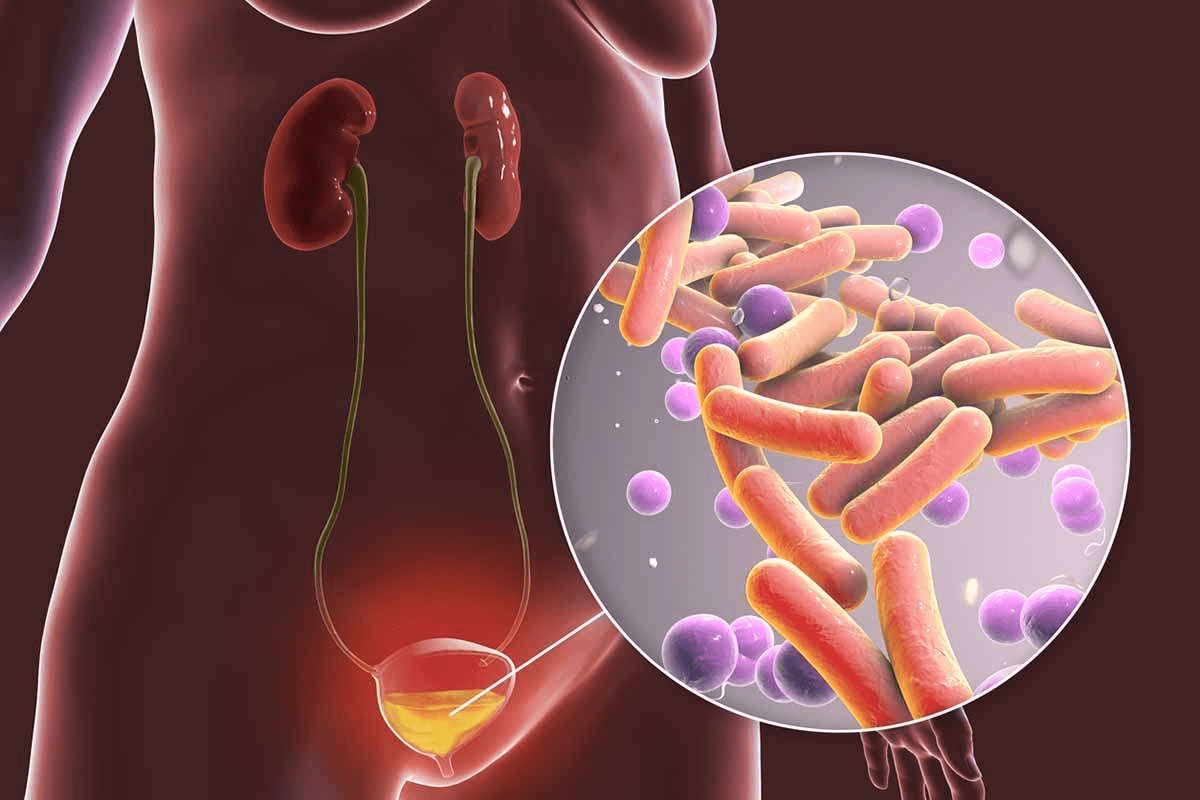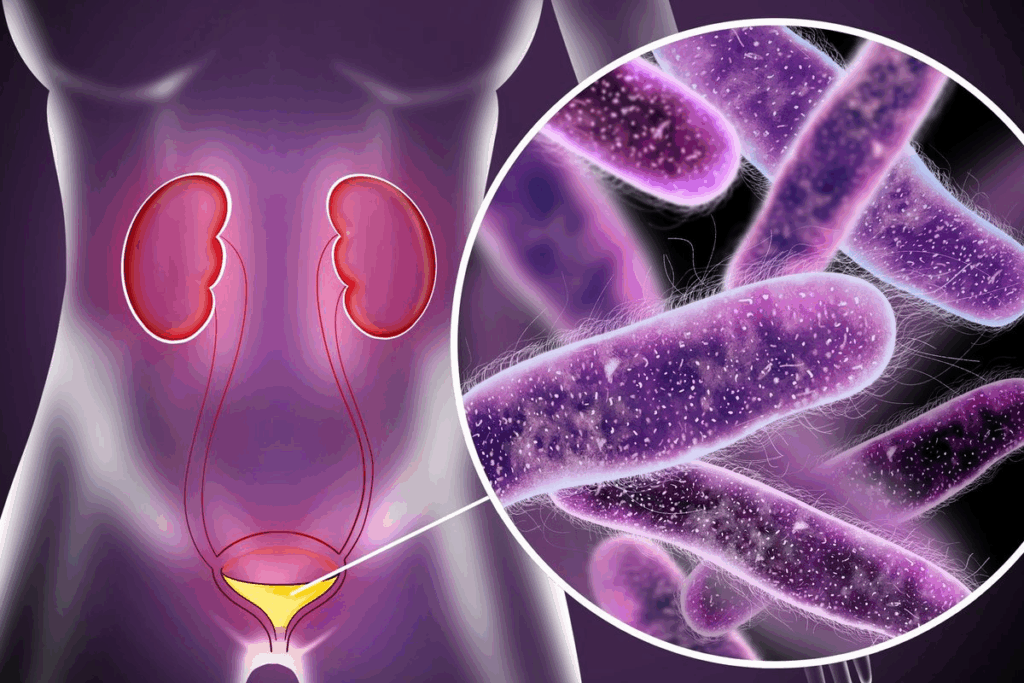
Urinary tract infections (UTIs) are often seen as minor issues. But, the truth is much more serious. If left untreated, UTIs can cause severe problems like sepsis and kidney damage. These conditions can be deadly, with up to 40% of people dying from them. Can you die from a urinary tract infection? Learn about the risk of sepsis, a life-threatening complication from an untreated UTI.
In 2019, over 236,000 deaths worldwide were linked to UTIs. This shows how dangerous these infections can be.
At Liv Hospital, we know how serious UTIs can be. Our team works hard to treat them quickly and effectively. We focus on our patients, aiming to prevent serious problems and get the best results.

UTIs are common infections seen in medical settings. They happen when bacteria get into the urinary tract through the urethra. Then, these bacteria multiply in the bladder.
The main reason for UTIs is bacteria getting into the urinary tract. Escherichia coli (E. coli), a common gut bacteria, causes most UTIs. Women, those who are sexually active, and certain birth control users are at higher risk.
Other factors include urinary tract issues, blockages, or catheter use. Knowing these causes helps in preventing and treating UTIs.
UTI symptoms can differ based on the infection’s location and severity. Common signs include a burning feeling when urinating and a strong urge to urinate. Women often feel pelvic pain.
Severe symptoms like fever, chills, and blood in the urine can occur. Spotting these symptoms early is key for quick treatment.
UTIs are categorized by the urinary tract area affected. The main types are:
UTIs are a big health concern with many causes, symptoms, and types. While common, they can cause serious problems if not treated. “If left untreated, UTIs can lead to severe consequences, including kidney damage and sepsis, a potentially life-threatening condition.” So, being aware and seeking medical help quickly is vital.

Urinary Tract Infections (UTIs) have a big impact worldwide. They cost a lot in healthcare, cause a lot of sickness, and can even be deadly. It’s clear that UTIs are a big problem for public health.
In 2019, there were 404.61 million cases of UTIs worldwide. This shows how common UTIs are globally.
Who gets UTIs can vary. Things like gender, age, and health conditions matter. These factors can increase your chance of getting a UTI.
UTIs can be deadly, mainly for those who are more vulnerable. In 2019, 236,790 deaths were linked to UTIs worldwide. This shows how serious UTIs can be, leading to more severe problems.
It’s important to know why UTIs can be fatal. This helps us find better ways to prevent and treat them.
Age is a big risk factor for UTIs and their serious effects. Older adults face a higher risk of UTI complications. As people get older, their risk of UTIs and fatal outcomes goes up.
The elderly (65+ years) are at even higher risk. This is because they may move less, have other health issues, and have weaker immune systems. So, it’s key to have special prevention and treatment plans for them.
By understanding UTIs’ global impact, we can tackle this big public health issue. This includes knowing how common they are, how many deaths they cause, and how age affects risk.
UTIs can turn from simple infections to life-threatening conditions. This is a serious issue that needs quick action. While most UTIs are treatable, some can lead to severe complications.
When a UTI reaches the kidneys, it can cause pyelonephritis. This is a more serious infection. If not treated fast, it can lead to even worse problems.
Urosepsis happens when UTI bacteria get into the blood. This is a very dangerous condition with a death rate of 20 to 40 percent.
Urosepsis is a severe septic condition that arises when the infection from the urinary tract spreads to the bloodstream. This condition is life-threatening and requires immediate medical intervention.
There have been cases where UTIs have caused death, mainly in the elderly and those with weak immune systems. These cases highlight the need for quick and effective UTI treatment.
Research shows UTIs can be deadly, even more so when they turn into sepsis. Below is a table with some key statistics on UTI mortality rates.
Condition | Mortality Rate | Population |
Urosepsis | 20-40% | General Population |
Sepsis from UTI | 30-50% | Elderly |
Untreated UTIs | Higher in immunocompromised | Immunocompromised Individuals |
Knowing the risks of UTIs and recognizing severe infection signs can prevent fatal outcomes. It’s vital for people, but those at higher risk, to get medical help fast if they have UTI symptoms.
It’s important to know how UTIs can become serious. If not treated right away, they can cause big health problems.
UTIs can move up to the kidneys, causing pyelonephritis. This happens when bacteria from the bladder go up the ureters to the kidneys. If not treated, it can damage the kidneys and even cause kidney failure.
Key factors that increase the risk of kidney infection include:
Urosepsis is a serious condition where UTI bacteria get into the blood. This can cause sepsis, where the body overreacts to the infection. This can damage tissues and organs.
The development of urosepsis is a medical emergency requiring immediate attention. Symptoms include fever, chills, rapid heart rate, and confusion. Without quick treatment, it can cause shock, organ failure, and death.
The body’s response to an infection, like a UTI, is called SIRS. SIRS can lead to sepsis and septic shock, which are very dangerous. This response can harm many organs, including the kidneys, lungs, and liver.
We need to understand the risks of UTIs and take steps to prevent them. Getting medical help quickly is key for those with UTI symptoms, and even more so for those at higher risk.
UTIs can cause more than just pain. They can harm the kidneys in serious ways. We’ll look at how UTIs can lead to kidney damage and diseases.
Acute kidney injury (AKI) is when the kidneys suddenly stop working. This often happens when an infection spreads from the bladder to the kidneys. “The kidneys filter waste from the blood,” “When they’re damaged, toxins build up in the body.”
UTIs can damage the kidneys in several ways. Bacteria can invade the kidney tissue, or toxins can harm kidney cells. People with kidney problems, diabetes, or other health issues are at higher risk.
Severe or frequent UTIs can lead to chronic kidney disease (CKD). CKD means the kidneys slowly lose function over time. This can lead to needing dialysis or a kidney transplant.
Preventing UTIs or treating them quickly is key. It helps avoid long-term kidney damage. Early action is important for kidney health.
UTIs can cause more than just kidney problems. They can lead to urethra narrowing in men, sepsis, and higher risks for pregnant women. They can also cause low birth weight in babies. People with recurring UTIs may face ongoing health issues and emotional challenges.
“The long-term consequences of UTIs highlight the importance of prompt and effective treatment to prevent complications and ensure the best possible outcomes for patients,” notes a leading urology expert.
In conclusion, UTIs can lead to serious kidney damage and other health issues. It’s important to be aware of the risks and take steps to prevent UTIs. This helps protect kidney health and overall well-being.
Some groups face a higher risk of severe urinary tract infections (UTIs). It’s key to know who these groups are to avoid fatal outcomes.
Elderly people face a higher risk of severe UTIs. This is due to a decline in immune function with age and the presence of other health issues. As we get older, our bodies fight infections less well, making older adults more likely to face complications from UTIs.
A study showed that those 65 and older are more likely to be hospitalized for UTIs. They also have a higher death rate compared to younger people. “The elderly are very vulnerable to the serious effects of UTIs,” a medical journal article recently noted.
Those with weakened immune systems, like people with HIV/AIDS or those on chemotherapy, are more at risk. Their bodies struggle to fight off infections, making UTIs more dangerous.
People with health issues like diabetes or kidney disease are at a higher risk. These conditions can make UTIs harder to treat and increase the risk of death.
Patients with urinary catheters are at a higher risk of UTIs. These infections can lead to serious problems. In healthcare settings, this is a big concern, mainly for the elderly and those who are very sick.
To lower these risks, healthcare must follow strict catheter management rules. They should also watch patients closely for UTI signs. Catching and treating UTIs early is key to preventing serious problems in these high-risk groups.
Knowing the risks of UTIs in these groups helps us take steps to prevent severe infections. As healthcare workers, we must teach patients and their families about these risks. We should also encourage them to seek medical help quickly when needed.
It’s important to know the warning signs of severe UTIs to avoid serious problems. We need to watch for symptoms that mean we should see a doctor right away. This helps us get help fast.
Severe UTIs show up in different ways that need quick doctor visits. Look out for severe pain in the lower abdomen or back, high fever that doesn’t go away, and signs of sepsis like confusion, rapid heartbeat, and extreme fatigue. If you see these signs, get medical help fast.
Sepsis is a serious condition where the body attacks itself because of an infection. It can cause shock, organ failure, and even death if not treated quickly. Watch for fever or hypothermia, increased heart rate, rapid breathing, and confusion or disorientation. If you think someone has sepsis, call for emergency help right away.
Doctors use tests to find out if you have a severe UTI. They might do urinalysis to look for bacteria or blood in your urine. They might also do blood cultures to see if bacteria are in your blood, which means sepsis. Sometimes, they use ultrasound or CT scans to see how bad the infection is.
If you have severe pain, high fever, vomiting, or signs of sepsis, go to the emergency room. Quick medical help can make a big difference. Don’t wait if you think your UTI is getting worse.
Effective treatment strategies are key to avoiding fatal outcomes from urinary tract infections. Early diagnosis and treatment can greatly reduce the risk of serious complications.
Early use of antibiotics is vital in treating UTIs. Prompt administration of the right antibiotics can prevent the infection from spreading to the kidneys. This can be life-threatening.
We advise patients with UTI symptoms to see a doctor right away. The choice of antibiotic depends on local resistance patterns and the patient’s health history.
Patients with severe UTI symptoms may need to be hospitalized. Prompt hospitalization is critical for close monitoring and aggressive treatment. This can save lives.
In the hospital, patients receive intravenous antibiotics, fluids, and supportive care. The elderly and those with health issues need extra attention.
Patients with sepsis need intensive care. Sepsis management protocols include aggressive fluid resuscitation and broad-spectrum antibiotics. They also support organ function.
Supportive therapies are essential in managing sepsis and preventing organ failure. This includes vasopressors for blood pressure, mechanical ventilation for breathing, and renal replacement therapy for kidney issues.
Understanding the importance of early intervention and proper management can greatly reduce UTI-related deaths. Healthcare providers must be quick to diagnose and treat UTIs, focusing on high-risk groups.
Urinary tract infections (UTIs) can be very serious. If not treated right, they can even be fatal. We talked about how UTIs can turn into life-threatening conditions like urosepsis. It’s key to get medical help fast.
People at high risk, like the elderly and those with health issues, face a higher risk of dying from a UTI. It’s important to know the signs and get help quickly. This can stop serious problems.
We need to spread the word about UTIs and their dangers. Knowing UTIs can be deadly if not treated right helps us stay safe. Getting a diagnosis and treatment early is the best way to avoid fatal outcomes.
In short, while UTIs can be dangerous, they can be prevented. We must keep talking about how serious UTIs can be. We should also encourage people to get medical help when they need it. This way, we can all stay safe from the bad effects of untreated UTIs.
Yes, if not treated, a bladder infection can turn into kidney infection or urosepsis. These can be deadly.
While rare, UTIs can be deadly. This is true for the elderly or those with health issues.
Yes, a UTI can be deadly. This happens if it leads to severe problems like urosepsis or kidney failure.
Untreated UTIs can cause serious problems. These include kidney damage, urosepsis, and life-threatening conditions.
UTIs can turn deadly by spreading to the kidneys. They can also cause urosepsis and trigger a severe inflammatory response.
The elderly, those with weak immune systems, and people with health issues are at higher risk.
Look out for severe pain, high fever, vomiting, and signs of sepsis. These need immediate medical help.
Yes, in severe cases, UTIs can be fatal. This is true when they are complicated by health issues or when treatment is delayed.
Early use of antibiotics, quick medical help for severe symptoms, and managing health conditions can prevent fatal outcomes.
Most UTIs are not deadly. But, they can become life-threatening if they cause complications like urosepsis or if they are untreated in high-risk individuals.
Yes, it’s possible to die from a UTI. This happens if it becomes a severe infection or leads to life-threatening complications.
Severe or recurring UTIs can cause long-term damage. This includes kidney damage, chronic kidney disease, and other health problems.
Subscribe to our e-newsletter to stay informed about the latest innovations in the world of health and exclusive offers!
WhatsApp us